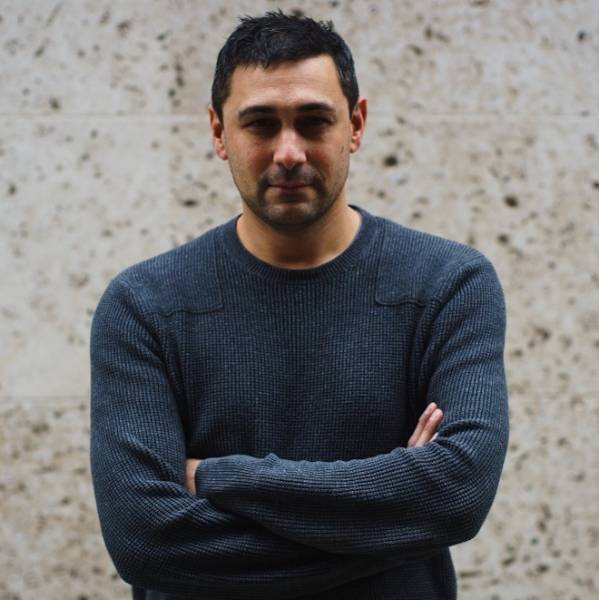Sophie Fiennes, sister of Joseph, Martha, and Ralph, has made a documentary about a thriving revivalist church in the ghetto of South Central LA, which contains some of the truest images of American life since Hoop Dreams. Previously, Fiennes has worked with that great near-mystic Peter Greenaway and the dancer Michael Clarke, and so knows well how to shoot a vision, how to make the audience a rapt voyeur.
There is no voiceover in Hoover Street, no elucidations to confine the material we just see with Fiennes' terrific eye. Her subject is Los Angeles itself, and it's a familiarly distressing collage of crime-scene tape, drive-bys, bulging prisons, drug stunted lives. Those who have seen Hoop Dreams will recall that the force flowing through it was the desire to escape the projects of Chicago via basketball, via athletic success. No such consolation is offered by Fiennes' vision of the featureless infinities of downtown LA. Pointedly punctuating the film are aerial shots of the megalopolis rendered abstract by its immense repetitiveness. The city is understood as infinite, without edge or centre block after block after block. It's as though this place had sprung up, dumb, from a dream of a vast construction site long strips and boulevards, the apotheosis of car-defined urbanism and the opposite of Western intellectual tradition, a place built around nothing in particular.
In this landscape, churches are built on slipways, constructed to catch the eye of the driver and subject to the same community-dispersing laws as out-of-town malls and multiplexes. The Greater Bethany Church, which Fiennes first visited to hear its lauded choir in the late 1990's, is a contemporary community church. Volunteers shrink-wrap video packs of services for those who failed to catch them on cable or radio the message gets out there on the airwaves, into cyberspace, onto the street. And the reason for this success is its supercharismatic pastor, Noel Jones, the protagonist of this, possibly the only pro-evangelist film ever made.
Jones is as aristocratic a presence as his sister Grace, but is soon animated by the Spirit, shimmying like Jello, riffing like Lenny Bruce, slaying the crowds' invisible devils. He is very tall, very slender. His face is serious but despite all his biblical references ("I am not trying to be denominational," says Jones, "just spiritual and biblical") is not entirely encrusted with the weighty culture of his two big themes: the calamity of drugs; feeling lost.
He comes to the stage like a be-bop musician, the crowd giddy and intense with thrill of him, their love as pure as a glass of milk. They are there to focus their attention on Jones's fingers as they syncopate his words, Jones's voice as it comes under 'The Power', Jones's rhythm as he like James Brown clutches his belly as though it were aching with the mangling and tangling of miracles hidden in there. And so he enters, the only cool man in a building full of hats and acres of Sunday best satin. Silence.
I DIDN'T HAVE TO GO TO WHERE PAIN AND BLOOD SET THE STAGE FOR CIRCULATORY SHOCK! A ragged, desperate gasp for breath. I FEEL A LITTLE CHURCHY! A spastic lurch. I'LL HAVE A LITTLE CHURCH IN A MINUTE! I FEEL LIKE PREACHING IN HERE! An octopoid clutch at the air with his fingers. WHAT TIME IS IT? TELL SOMEBODY IT'S GETTING UP TIME! JESUS, ARE YOU COMING UP TODAY? WELL, I'M COMING WITH YA! Another raggedy gasp with a voice intensely bluesy, his vowels the size of the earth, his T's like a match being struck to look for tumult. He is unstoppable, and by now (as the congregation rise to their feet, overwhelmed by his innate musicality) leaching meaning. I FEEEEL LIKE PREACHING! A great shaman who is quite obviously the star around which a whole community has been put together.
And in America we know the fate of these video vicars secular faith in the great preachers took a disastrous knock in the 1980's on the back of the Jimmy Swaggart and Oral Roberts scandals. Reagan's eschatological tendencies ("Israel is the only place which fulfils the criteria for Armageddon") compounded the general mistrust of US fundamentalism and now we have Bush, with his prayer breakfasts and 'axis of evil'. But Jones is an upholder of the great revivalist traditions, with their local intensity, their everyday secular urgency, their communion of physicality. You wouldn't want to see Jones sucked onto the arena circuit the European tours, the stadium sell outs. But success in America very rarely leaves anyone master of their fate. It's like watching a great band on the brink of breaking, about to stop being great. If indeed, as some worry, the American-Arab conflicts of the next few years are conflicts of religion, then the ecstatic and tolerant raps of men like Jones are the acceptable face of both sides in a time of mounting inflexibility. What Reagan shared with Osama Bin Laden was a belief that the time of rapture was at hand, a cynical exploitation of the apocalyptic elements of both Christianity and Islam for the purposes of political brinkmanship. No doubt in a landscape of sudden plagues and miraculous acts of war this trait will continue, but on Hoover Street religion remains a wholly practical, ecumenical means of getting by. The irony is that most people in this film are seeking salvation from the destruction waged by a catastrophic federal policy on drugs. And it is the pseudo-religiosity of white wealthy American society as a whole which makes the possibility of drug legalisation more remote than it is in other Western democracy. Jones, with his demotic genius, is precisely the sort of guy you want to stay preaching downtown.
But can American success leave him alone?
Hoover Street Revival is released nationally on the 4th July.

